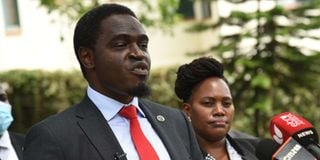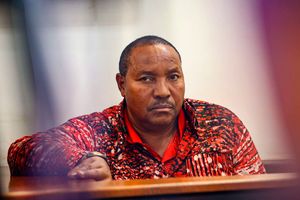Premium
Lawyers sue Havi, LSK council in fight against SGM resolutions

Law Society of Kenya (LSK) President Nelson Havi and Vice President Carolyne Kamende Daudi address journalists at LSK's offices in Nairobi on November 16, 2020.
What you need to know:
- They want the court to suspend implementation of the resolutions for violating the Constitution, regulations of the LSK Act and rules of natural justice and legitimate expectations.
Six lawyers have sued Law Society of Kenya (LSK) President Nelson Havi and the society's council members over resolutions at a chaotic general meeting that laid bare the factional wars in the organisation.
Led by Mr Lempaa Suyianka, they want the court to suspend implementation of the resolutions for violating the Constitution, regulations of the LSK Act and rules of natural justice and legitimate expectations.
The other lawyers in the suit are Calistous Shifwoka, Tom Kopere, Felix Ndolo, Sofia Rajab and Melba Katsivo.
One of the controversial resolutions passed in the meeting concerned the forensic audit of LSK's books of account following claims of loss of funds and suspension of the council.
Evidence lacking
Justice Pauline Nyamweya certified the case as urgent but declined to grant the lawyers an instant order baring implementation of the disputed resolutions.
"While the ex parte applicants have brought evidence to show that the resolutions are already being implemented, the entire corpus of resolutions made at the impugned Special General Meeting (SGM) is not evident, and neither are the stages of their implementation," said the judge.
"This information and evidence needs to be disclosed by the respondents at an inter partes hearing to guide the court in determining the issue of whether or not stay can be granted."
In their court documents, the lawyers also want an an order compelling Mr Havi and the council to place the agenda from the SGM before the statutory Annual General Meeting (AGM) scheduled for March 2021.
They also want Mr Havi to be forced to facilitate online polling on all agenda items and decisions at the Annual General Meeting or at a properly convened and fairly conducted Special General Meeting, as the case may be.
They indicate that during the recent meeting, Mr Havi inexplicably excluded all the online attendees from decision-making and denied them the opportunity to vote on any issue.
"Mr Havi acted unreasonably by refusing to run an online poll and instead requiring applicants (who were attending the meeting online on the Zoom webinar format, with video off and audio muted) to vote by 'showing their hands'. By this, he unjustifiably limited the Applicants’ rights contrary to Article 24," they said.
The online registration enabled Mr Havi and the council to attain the quorum for the meeting (a third of all members of the society).
Meeting aspects questioned
To support their case, the lawyers attached copies of the transcripts of the chat history and question and answer session of the Law Society of Kenya Zoom Special General Meeting held on January 18, electronic copies of the Zoom recording of the said meeting and accompanying certificate of authenticity.
Lawyer Ochiel Dudley said 3,000 LSK members registered to participate in the SGM online while another 200 members were invited or otherwise managed to attend the meeting physically at Gitanga Road as Covid-19 protocols could not allow a higher number.
"Only the 200 members, in the main meeting consisting of a carefully-chosen cabal of the Mr Havi's yes-men and women participated in the meeting," he said in the application.
Mr Lempaa, in his supporting affidavit, says the lawyers spent the entire meeting begging Mr Havi to allow them to participate.
"I am aware that from the start of the meeting at 11.38 am until 12.42pm, applicants made 397 requests for a poll on the chat platform. Again, I know that from 1.51pm to 5.35pm applicants made 333 requests for a poll on the chat platform. Altogether, the applicants made at least 730 requests for a poll," he says.
The lawyers also want their grievances exempted from the internal remedy provided under section 36 of the Law Society Act.
They said that under section 36, a resolution of a general meeting “shall not be altered or rescinded within nine months after the passage of the resolution without a special resolution of the society”.
"Despite the urgency, therefore, internal remedy involves applicants waiting nine months (without respite) for an ordinary resolution, or raising a special resolution before then: a herculean task," they said.
Justice Jairus Ngaah will hear the case on on February 4.





